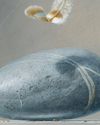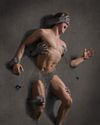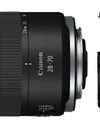
THE MISSION
Use our inky start images to create graphic art in Elements
Time needed
15 minutes
Skill level
Beginner
Kit needed
Photoshop Elements 2020
Editing your pictures in programs like Adobe Photoshop CC, or even the more budget friendly Photoshop Elements as we’re using here, doesn’t have to be about creating the most accurate or sharp images. Sometimes it can just be a playground where we can have fun and learn some new editing tricks along the way. Today, we’ll combine a bit of both by incorporating ink splat start images into your own photographs to create some striking graphic art.
We’re giving away 18 ink spatter shots that we’ve created by dropping some black ink, or flinging it from a paint brush, onto a sheet of white A4 paper.
You can try this yourself if you’d like to experiment with even more ink effects. Just set your camera to Aperture Priority (Av) mode with an aperture of f/8 for strong sharpness. Then, boost the ISO until you get a shutter speed of at least 1/200 sec to eliminate camera shake. A macro lens can help you get closer to the ink splodges too and make them appear larger in the frame.
Adding these splashes to portraits works very well, but can also be just as effective with landscapes. Either way, it’s a fun technique to try if you’d like to start creating composites (combining multiple images using layers) in Photoshop.
This story is from the October 2020 edition of PhotoPlus : The Canon Magazine.
Start your 7-day Magzter GOLD free trial to access thousands of curated premium stories, and 9,000+ magazines and newspapers.
Already a subscriber ? Sign In
This story is from the October 2020 edition of PhotoPlus : The Canon Magazine.
Start your 7-day Magzter GOLD free trial to access thousands of curated premium stories, and 9,000+ magazines and newspapers.
Already a subscriber? Sign In

The Art of Copying Art - James Paterson shows you how to use your Canon gear to capture artwork and paintings the right way with simple camera and lighting skills
Whether you want to capture a painting like the above, digitise old prints or reproduce any kind of canvas, there's real skill in capturing artwork with your camera. Not only do you need the colours to be accurate, you also need to master the spread, angle and quality of the light to minimise glare and show the work at its best.This painting by the artist Bryan Hanlon has a wonderfully subtle colour palette. To reproduce the painting in print and digital form, it needs to be captured in the right way.

Fright night
Canon photographer and digital artist Alexander loves to craft incredible fantasy scenes with a spooky horror twist

Sharpen your shots with DPP
Sharpening a digital image also increases contrast at the edge of details

CANON ImagePrograf PRO-1100
Deeper blacks, better bronzing, greater lifespan and 5G Wi-Fi -Canon's new printer is full of new tech, says

Canon's new 'kit lens' is actually a half-price f/2.8 trinity lens!
The Canon RF 28-70mm F2.8 IS STM lacks a red ring, but borrows premium features from its L-series siblings

DREW GIBSON
Pro motorsports photographer Drew on why he hasn't (yet) switched to Canon's mirrorless system, why old-school techniques can be the most reliable, and the lessons learned from more than a decade shooting the world's biggest car brands

Up in smoke
Make a smoky shape in Affinity Photo and get to grips with the amazing Liquify Persona under the guidance of James Paterson

Expand your creativity with Generative Fill
Photoshop's Al-powered feature brings revolutionary new tools to image editing. James Paterson reveals all...

Turn your images into vintage postcards
Wish you were here? Sean McCormack explains how you can give your summer photographs a vintage postcard look

The Angel Malibu
Light painting an American movie producer in the Wadi Rum Desert in Jordan was a highly unlikely evening out for David!